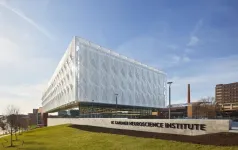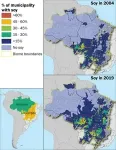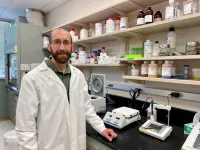Cincinnati, OH (Monday, Oct. 30, 2023) – The University of Cincinnati and UC Health have been renewed as the National Coordinating Center of the National Institutes of Health (NIH) StrokeNet, which is the primary infrastructure for multicenter trials of stroke funded by NIH and the pipeline for new potential treatments for adults and children with stroke and those at risk for stroke.
Created in 2013, NIH StrokeNet conducts clinical trials and research studies to advance acute stroke treatment, prevention, and recovery and rehabilitation following a stroke. The national network includes 27 regional coordinating centers or hubs associated with over 200 hospitals enrolling in its trials.
The University of Cincinnati has served as the National Coordinating Center for NIH StrokeNet since its inception in September 2013, with renewal every five years, most recently in October 2023 with Joseph Broderick, MD, physician-researcher and Director of the UC Gardner Neuroscience Institute as Lead PI and Pooja Khatri, MD, MSc, physician-researcher, Associate Director of the UC Gardner Neuroscience Institute, and Vice-Chair of Research at the UC Department of Neurology and Rehabilitation Medicine as Co-PI.
In December 2023, Dr. Khatri will be competitively awarded the grant as Lead PI. The renewed infrastructure has 21 ongoing or upcoming studies, and is currently partnering with researchers in seven countries and at seven companies to help advance stroke care worldwide. NIH StrokeNet will have new features including enhanced activities related to patient representation and advocacy and diversity, equity and inclusion initiatives, as well as a new Clinical Research Professional training initiative.
Also new to NIH StrokeNet, the neuroimaging team led by Achala Vagal, MD and Vivek Khandwala, PhD, will be formally named as the NIH StrokeNet Imaging Management Center. Their activities have already brought efficiency and expertise to developing the imaging aspects of trial designs, and collecting and analyzing brain images worldwide.
“It is truly a privilege to harness the leadership and experience of the stroke research field to create and complete high-quality, multi-site trials, as well as collaborate with other stroke networks worldwide,” Khatri said. “We are also proud to be able to bring our expertise to our local community every day with a state-of-the-art perspective.”
Since 2013, more than 11,000 patients have been enrolled in NIH StrokeNet trials. These studies have led to significant advances in patient care worldwide. As an example, the DEFUSE-3 study published in 2018 improved acute stroke care by demonstrating that endovascular therapy resulted in better long-term outcomes than medical therapy alone for acute ischemic stroke patients beyond conventional time windows with at-risk brain tissue. The study received a U.S. congressional award for the significance of its impact upon patient care.
“StrokeNet brings together leadership and researchers across the country to work more efficiently and avoid duplication of efforts with one centralized infrastructure,” Broderick said. “This research network has significantly advanced the field of stroke and directly resulted in improvements to patient care and outcomes in our region and across the world over the past decade. We are thrilled to be able to continue this important work.”
Khatri is a leading researcher internationally in the field of stroke. She has led studies that helped develop and optimize mechanical clot removal, which is now an established treatment for more severe ischemic strokes. Ischemic strokes are the most common form of stroke which occurs when a vessel supplying blood to the brain is obstructed. Her research has also changed clinical practice guidelines to improve the care of those with the mildest ischemic strokes.
“Clinical outcomes have advanced dramatically in the last decade, thanks to clinical trials that test what works and what does not in systematic and careful ways across the range of people who would receive them,” Khatri said. “Moreover, these advancements are made possible by the patients who decide to participate in clinical trials. I am especially excited that we have found ways to do our trials more efficiently to speed up our pace of advancing stroke care. Many of our 21 studies have highly innovative designs.”
Broderick, also a leading researcher, was part of the University of Cincinnati team that conducted breakthrough studies in the 1980s leading to the use of the clot-busting drug tPA as the first proven treatment for ischemic stroke. He also led key studies to develop mechanical clot removal for severe stroke.
“I would love for every stroke patient to have the opportunity to participate in a research study that may help them or patients like them in the future,” Broderick said. “I advise patients to be proactive. And as physicians, we need to be proactive, too.”
UC and UC Health’s role as the StrokeNet National Coordinating Center also includes pharmacy and single institutional review board (IRB) services, and contract management with all clinical trial sites for the network. The NIH StrokeNet Research Pharmacy at UC Health led by Noor Sabagha, PharmD, has shipped more than 12,000 study drugs to US trial sites, and guided drug-related study design and management worldwide, for the past five years. The UC IRB serves as one of the central IRBs of NIH StrokeNet, and has over 350 relying institutions under the leadership of Michael Linke, PhD. UC has executed over 1,000 new clinical trial agreements in the last five years alone under the leadership of David Gearring Sr., MHA.
UC and UC Health will also continue to serve as Ohio Valley Regional Coordinating Center within NIH StrokeNet, providing expertise and access to clinical trials in hospitals across southwest Ohio and beyond, and includes Ohio State University. The Ohio Valley region network is among the leading enrollers in StrokeNet trials countrywide. UC Gardner Neuroscience Institute physician-researchers Eva Mistry, MD, and Stacie Demel, MD, are the principal investigators for the Ohio Valley Regional Coordinating Center.
NIH StrokeNet is funded by the National Institute of Neurological Disorders and Stroke (NINDS). UC expects to receive over $14 million in funding over the next five years as the national coordinating center.
In addition to leading the way in clinical research, UC Health is an Advanced Comprehensive Stroke Center, one of just 4% of hospitals in the U.S. with specific abilities to treat the most complex stroke cases. UC Gardner Neuroscience Institute stroke experts consult with physicians and care teams in community hospitals across Greater Cincinnati. UC Health is also home to the region’s first and only Mobile Stroke Unit, bringing the care of an emergency department directly to stroke patients when they need it most.
A stroke occurs when a clot blocks the blood supply to the brain (ischemic stroke) or when a blood vessel in the brain bursts (hemorrhagic stroke). Stroke is the fifth-leading cause of death and a leading cause of disability in the United States, according to the American Heart Association/American Stroke Association. More than 160,000 people in the U.S. died of stroke in 2020.
###
About UC Health
UC Health is an integrated academic health system serving the Greater Cincinnati and Northern Kentucky region. In partnership with the University of Cincinnati, UC Health combines clinical expertise and compassion with research and teaching – a combination that provides patients with options for even the most complex situations. Members of UC Health include: UC Medical Center, West Chester Hospital, Daniel Drake Center for Post-Acute Care, Bridgeway Pointe Assisted Living, University of Cincinnati Physicians and UC Health Ambulatory Services (with more than 900 board-certified clinicians and surgeons), Lindner Center of HOPE and several specialized institutes and centers, including the UC Gardner Neuroscience Institute and University of Cincinnati Cancer Center. Many UC Health locations have received national recognition for outstanding quality and patient satisfaction. Learn more at UCHealth.com.
END




